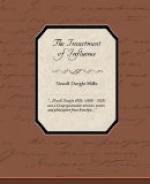Humble also is the origin of the anti-slavery movement that won its final victory at Appomattox. A century and more ago a young Moravian made his way to Jamaica as a Herald of Christ and his message of good-will. The horrors of slavery in that far-off time cannot be understood by our age. Then each week some African slaver landed with its cargo of naked creatures. Slaves were so cheap that it was simpler to kill them with rapid work and purchase new ones than to care for the wants of captives weakened by several summers. What horrors under overseers in the field! What outrages in slave-market and pen! So grievous were the wrongs negroes suffered at white men’s hands that they would not listen to this young teacher. At last, despairing of their confidence, the brave youth had himself sold as a slave and wrought in the fields under the overseer’s lash. Fellowship with their sufferings won their confidence and love. When the day’s task was done the poor creatures crowded about him to receive Christ’s cup of cold water. Long years after the young hero had fallen upon the sugar plantation his story came to the ears of young Wilberforce and armed him with courage invincible against England’s traffic in flesh and blood. Soon Parliament freed the West India slaves and Lincoln emancipated our freedmen. But side by side with the heroes of liberty famed through monument and solemn oration, let us mention the young Moravian hero who loved Christ’s little ones, and in giving “two mites and a cup of cold water,” lost his life, indeed, but found immortal fame.
This modest deed that bought renown also tells us that enduring remembrance is possible for all. Great deeds the majority cannot do. Two-talent men march in millions, but the ten-talent men are few and far between. Many scientists—one Newton. Thousands of poets—but the Elizabethan eras are separated by centuries. Great is the company of the orators—but to each generation only one Webster and one Clay. As each continent hath but one mountain range, so the elect minds stand isolated in the ages. All greatness is mysterious, and like God’s throne, genius is girt about with clouds and darkness. If great men are infrequent, the world’s need of great men is as occasional. Society advances in happiness and culture, not through striking, dramatic acts, but through myriads of unnumbered and unnoticed deeds.
Even the heroes dying upon the battlefield ask not for Plato nor Bacon, but for a cup of cold water. To Benedict Arnold, dying in his garret, came a physician, who said, “Is there anything you wish?” and heard this answer; “Only a friend.” Traitors sometimes each of us also. Traitors to our deepest convictions and our highest ideals, and in the hours when the fever of discontent burns fiercely within us, and the mind seems half-delirious in its trouble, we also ask for a friend bringing a mite of sympathy and a cup of cold water. Let us confess it—we are all famishing for love and the kind word that says: “In your Gethsemane you are not alone.”




